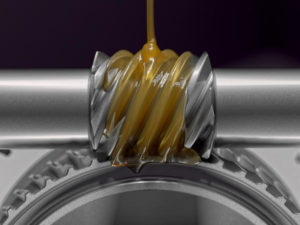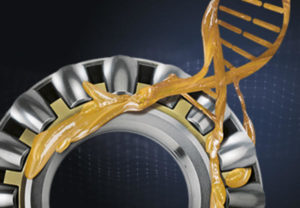Grease or Oil?
Many operators proclaim that they prefer oil over grease. However, then again, there are those who advocate grease above all else. In actuality, both trains of thought are backed by compelling arguments. It seems that for every point in support of each product, there is also an equally strong counterpoint. The grease versus oil argument is a constant discussion and has been for many years, with equally opposing views as to which is better. Below, we look at a number of these arguments, both for and against, detailing why you should use either product.
The Benefits of Grease
- Grease has a superior stop-start performance. For example, when a machine is shut down, oil drains back to the sump, but grease remains in the component (where it is needed), reducing the risk of a dry start.
The argument for oil: The majority of bath, splash and circulating-oil systems can lubricate almost immediately on restart. Higher volumes of oil (in contrast to grease in the same application) means a more significant number of additives and the ability to wash contaminants away from the working zones where a high rate of friction can occur.
- Worn seals and connectors can hold onto grease better than oil, and this beneficial retention lowers the risk of lubricant starvation and leakage. This retention also reduces the risk of the lubricant causing damage to, or staining, the work product (e.g. food, newsprint, and textile).
The argument for oil: True, grease is less prone to leakage, but then again leakage is a sign of a machine that is exposed (internally) to the environment and requires repair. Worn seals that go unnoticed won’t get better over time and present the risk of a more severe or even catastrophic failure in the future.
- Surplus grease packed tightly around seals and connectors serves as a sealant, preventing the entrance of particles and water. Regular re-greasing can remove contaminants out, and away, from the working surfaces of the component.
The argument for oil: The majority of industrial machines are not re-greased consistently enough to rely on this for shifting contaminants from seals and cavities adjacent to bearings. The practice of re-greasing could potentially drive these contaminants directly into the core of the bearing and cause imminent failure.
The Benefits of Oil
- Unlike grease, oil flows freely throughout the component, enabling it to conduct and remove unwanted heat. In turn, this keeps the base oil viscosity stable and reduces the risk of oxidation and additive depletion caused by excessive heat.
The argument for grease: When chosen correctly for a given application, the temperature of grease remains reasonably low and reduce the risk of premature oxidation. Many long-life grease applications have exceeded ten years of service.
- Compared to oil, the churning of grease in gears and bearings results in high energy-consumption losses and heat generation. The energy that is consumed by oil when used in a similar application may be only a portion to that of grease.
The argument for grease: When bearings are lubricated correctly, and with the right product, churning losses are negligible. Excess grease that is not required gets pushed to the side and away from any moving parts. This action helps form a suitable channel, leaving only the required amount of grease for lubrication. Oil, on the other hand, continues to flow back into the corridor of moving parts, churning and creating heat.
- Because oil doesn’t use thickeners, there is no risk of incompatible thickeners clashing which would alter the grease consistency and cause other issues.
The argument for grease: You can argue that there is security when mixing two oils together when compared to the mixing of two grease products. Indeed, oil does not use thickeners in their formulation, but there is always a risk of base oil and additive incompatibility if, for example, accidental mixing is present. Moreover, unlike some oils, grease additives won’t settle out when machines are at rest or stored.
- Oils allow certain contaminants such as water and dirt to be temporarily suspended and transported to filters, separators and settling zones. Grease suspends these types of pollutants Some grease products can suspend 100% of their weight in water.
The argument for grease: Unlike grease, circulating oil can transport with it harmful contaminants to all areas of a system. This act increases the risk of wear and corrosion to multiple parts and surfaces at the same time. Grease keeps most contaminants localised and immobilised and can potentially displace them away from critical surfaces.
- Oil volume in machine components can be precisely controlled using level gauges and sight glasses. On the other hand, grease volume is nearly impossible to monitor and can be very difficult to control. One of the most prominent causes of bearing failure is over/under greasing.
The argument for grease: Technicians using the proper tools and procedures should have no problem putting safe quantities of grease into bearings and components of a similar nature.
- An oil change can be carried out without dismantling machine hardware. Grease must be repacked periodically, which involves a considerable cost associated with labour, material and
The argument for grease: Many greases using machines can run for years without the need to repack the bearings. Oil compartments, however, sometimes require constant drainage and refills.
- Machines that are lubricated by oil are much easier to sample for analysis. An equivalent grease sample is nearly impossible to obtain.
The argument for grease: Potentially 90% of bearings and components that get lubricated with grease are noncritical and won’t need routine sampling and analysis, and more efficient ways of sampling are under development.
- Used oils can be handled and disposed of safely with a minimal amount of impact on the environment. Most grease-lubricated machines are total-loss systems meaning that there is no environmentally easy way to recover and remove degraded or contaminated products.
The argument for grease: Oil is more environmentally problematic than grease. As stated above, its propensity to leaks out of machines is much higher than grease meaning it can contaminate at-risk areas such as water, soil and landscapes much easier.

Conclusion
Grease is a vital lubricant used in a host of applications, from electric motor bearings to open gears, wheel bearings to CV joints and even agricultural and construction industries. Such applications can see the machinery operating in extreme heat and dust environments, in the middle of a quarry or sub-zero temperatures like a freezer or even on a fishing trawler in the Atlantic Ocean.
Just as there are many applications, conditions and environments, there are also as many different types of grease and brands. To choose the right product you need to consider all the requirements. Ideally, discuss these factors with a lubricant expert to help you determine which grease you need.
To find out more about the full range of greases available at Finol Oils, contact one of our highly experienced technical team at 01-455 5484 or go click here to view the full range.

